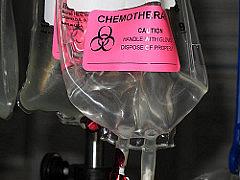Researchers discover a possible way to avoid expensive chemotherapy in early-stage breast cancer

Individuals diagnosed with early stage cancers, such as breast cancer, including their families, face a number financial of challenges. For example, it was reported in 2014 that the cost of Herceptin, a chemotherapy used to treat breast, stomach, and esophageal cancer, generically named trastuzumab, averaged at $5,100 per month.
The cost of chemotherapy constitutes over half of cancer treatment-related costs in the U.S. According to a recent report by the IMS Institute for Healthcare Informatics, the overall cost of cancer care has catapulted since 2011, with cancer drugs constituting 11.5 percent of total drug expenditures in the U.S. in 2015, as compared to 10.5 percent in 2011. The rising cost of cancer treatment merely exacerbates the rising issue of chemotherapy drug affordability.
Individuals diagnosed with early stage cancers, such as breast cancer, including their families, face a number of financial challenges. For example, it was reported in 2014 that the cost of Herceptin, a chemotherapy used to treat breast, stomach, and esophageal cancer, generically named trastuzumab, averaged at $5,100 per month. Further, as hospital systems began and continue to acquire private medical practices, this cost drastically increases, as private medical offices administering chemotherapy are labeled as “hospital outpatient centers” and thus qualify for additional overhead payments.
Chemotherapy-related costs place a significant financial burden on vulnerable cancer patients. These patients ultimately pay the price both financially and physically through either lost wages due to possibly unpaid medical leave, expensive co-payments and co-insurance, and/or decreased quality of life (courtesy of chemotherapy’s side effects).
Authors of a Kaiser Family Foundation article entitled “Medical Debt among People with Health Insurance” outline and describe several case study scenarios of average, working class individuals who struggle to pay their exorbitant medical bills. Among those scenarios is Katherine, a 46-year old customer service representative earning nearly $19k per year, and breast cancer patient whose health care costs ($35k) exceeded the coverage limits under her small employer-sponsored health plan. One can barely fathom this scenario when a patient lacks health insurance.
What if early-stage breast cancer patients had a scientifically-backed opportunity to safely avoid chemotherapy? A recent study, funded in part by the European Commission Sixth Framework Program, provides this form of light down the dark road of early-stage breast cancer.
A group of researchers across Europe and the U.S. published results from a randomized, phase 3 study in The New England Journal of Medicine, which describes how a 70-gene signature test (a biomarker test), called MammaPrint, categorized close to 7,000 early-stage breast cancer patients as either high or low clinical/genomic risk of distant metastasis. Women categorized as high clinical and low genomic risk, based on the Mammaprint results, did not receive chemotherapy and subsequently yielded a 5-year survival without distant metastasis rate of 94.7 percent. The study’s target survival rate range for this group was 92.5 to 96.2, rendering the study a success.
These findings suggest that close to half of early-stage breast cancer patients at high clinical, yet low genomic, risk of metastasis may not require chemotherapy. Therefore, MammaPrint may be a revolutionary measure against the rising costs of chemotherapy.
As with most genomic tests or screenings, there are limitations to consider. Among these limitations, particularly in the U.S., are 1) the need to assess the total costs of the such genomic tests or screenings, and obtain the difference between such costs and the total cost of chemotherapy; 2) insurance claim denial of physician-ordered genomic testing, as such tests are often deemed “investigational” versus “medically necessary”; 3) patient privacy and protection, and perhaps “meaningful use,” under the Genetic Information Nondiscrimination Act; and 4) the need for additional, long-term research showing survival without distant metastasis rates beyond 5 years for early-stage breast cancer patients at high clinical risk, yet low genomic risk, of metastasis.
Nonetheless, these limitations should not deter the U.S. health system and patients away from genetic testing in cancer care, as such testing is a measurable step toward "precision medicine" that is personalized, affordable, and value-based.
[Photo via Flickr.]

